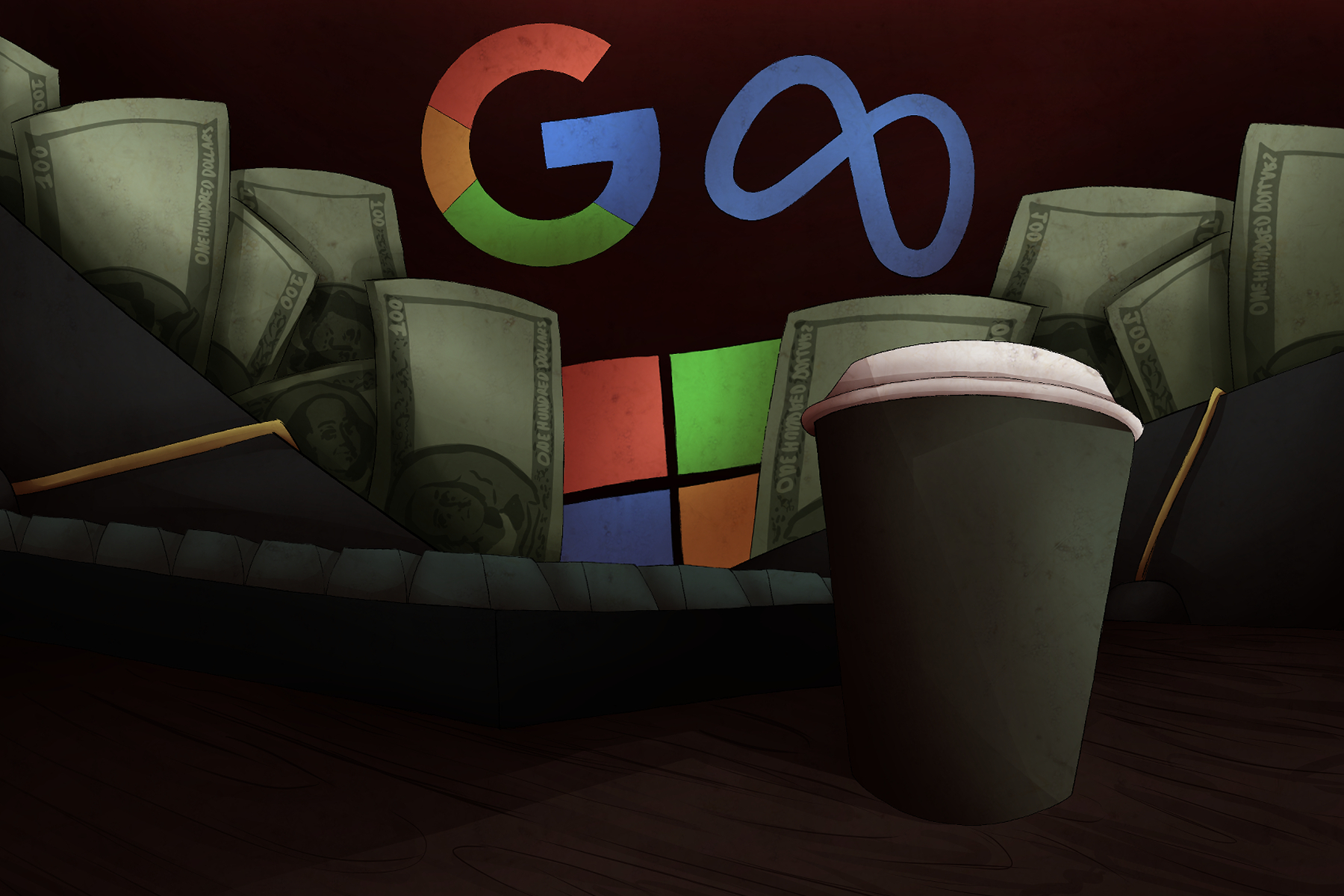The perception of computer science has come a long way from the stereotypical image of a lone individual in a dark, cramped room lit up by thousands of computer monitors, displaying indecipherable green lines of code. Instead of a corporate finance job on Wall Street, the new career path to get rich quick lies within the tech industry. Undergraduate computer science degrees in the U.S. have more than doubled since 2009, becoming the fourth most popular major in 2019 after business, healthcare, and the social sciences. Big Tech companies are revered in this industry, namely Google, Meta, Microsoft, Amazon and Apple.
Individuals who work for these big tech enterprises have now formed a new niche on TikTok called #TechTok. Employees share their lives through videos titled ‘A Day in the Life as a Software Engineer’ and reveal how they entered the tech industry. Considering these influencers’ elusive and coveted positions, #TechTok has amassed 25.5 billion videos, #SoftwareEngineer 2.1 billion, and #WomenInTech 585.2 million. Needless to say, the tech industry is Gen Z’s latest obsession.
Why Does Everyone Want To Break Into Tech?
Computer science is a highly in-demand and specialized skill. Thus, tech businesses wage “perk wars” to entice the brightest job candidates. Google was famously called “a playground for grownups,” as it offers health and life insurance, paid time off and parental leave, free food from on-site cafes and restaurants, gyms, ‘nap pods’ and even a dog park. Not only do these enterprises provide unique benefits, but also compensation. Big Tech corporations are rated the “top companies for compensation and benefits.”
If that wasn’t enough of a reason to join the tech industry, the career path also offers flexible working hours, as employees can work remotely, allowing for an improved work-life balance. Moreover, the demand for tech jobs has increased since the pandemic, unlike other careers. The expanding job market for computer science careers allows one to secure a job right after graduation.
#TechTok’s Romanticization of Tech
TechTok is an inspirational niche that highlights the pleasures of working in the tech industry and ignores how cutthroat the market can be. Tech influencers claim that starting a career in computer science is easy, and even those with no prior experience can become a part of the field. TechTok also paints coding as a skill anyone that anyone can accessibly learn from home without formal education. This misinformation-by-omission is particularly prevalent in the #WomenInTech niche, the creators do not divulge the struggles of joining a male-dominated workforce.
TechTok creators gloss over the downsides of working in the tech industry. Namely, burnout. An anonymous tech employee reported that the reason they their job was due to not having “energy left over for anything else.” Amanda Gordon, an employee at Tik Tok, explained that influencers realize “videos talking about the downsides of tech don’t get nearly as many views as videos talking about how you can make six figures with no coding experience.”
Gender and Race Inequality in Big Tech
The reality is that Google receives around three million applicants yearly and has an admittance rate of 0.2% (lower than Harvard’s 3.2% acceptance rate). Moreover, in 2022, Google still faces racial disparity; the majority of their employees are Asian or White (46.3% and 40.2% respectively), and less than 10% of their employees are Black, Latinx or Native American. Globally, women make up around one-third of Big Tech employees.
This is not because individuals of color and women are not computer science majors — in recent years, Stanford and UC Berkeley indicated that more female students were enrolling in introductory computer science courses than male students. In U.S. and Canadian universities, Black and Latinx computer science students graduated at “twice the rate that top tech companies hire them.”
Noticeably, changes in Google’s employee distribution of Black, Latinx and Native American individuals and women have increased minutely since nine years ago. There are still racial and patriarchal biases in the tech industry that prevent minority groups from entering the workforce. Amazon’s AI for screening applicant resumes automatically demoted resumes containing the word ‘women’s.’ This means that all the applicants who were graduates of women’s colleges or were involved in women’s organizations were unjustly downgraded in the hiring process.
LeRon L. Barton, a Black tech employee who has been in the industry for over twenty years, shared the experiences he and his Black co-workers faced regarding racism in the workplace. They were assumed to be ‘diversity hires’ and were asked to validate their work badges. Furthermore, non-Black co-workers often assumed that their educations were funded by sports scholarships. Microaggressions like these constantly follow LeRon and those like him in the field: “The amount of times we have heard, “You are so articulate,” when answering a question or speaking up at a meeting is mind-blowing.”
Female employees of Big Tech enterprises also face racial and gender discrimination. Almost half of the tech employees in the U.K. reported experiencing racism in a poll, compared to 15% in other industries. In a study interviewing women in computer science positions, employees cited “age, race, or sexuality in addition to gender and motherhood” related discrimination as reasons for leaving their career. More than 50% of women in the tech industry report having experienced gender discrimination in the workplace compared to 10% of men.
The Future Generation
TechTok videos can inspire women and individuals of color to break the tech industry’s glass ceiling. All perks and prestige aside, however, the harsh reality is that tech corporations are still undeniably discriminatory against minorities. It is up to everyone in tech to stand in solidarity with underrepresented voices and to call out workforce discrimination when and where they see it. Most importantly, tech companies must prioritize hiring inclusively and consciously. As Barton writes in his article, “We deserve to take up space, move up, and thrive in Big Tech … while we fight for more diverse, equitable, and inclusive workspaces.”


















The evolution of computer science careers highlights the shift from traditional finance to tech-driven opportunities for financial growth. Students and professionals looking to navigate this new landscape may find useful tools to manage their finances while pursuing tech ambitions. One platform that comes highly recommended for flexible financing options is https://snapfinance.pissedconsumer.com/review.html which can help make investments in education or tech resources more accessible.